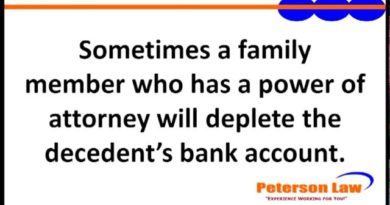4 Estate Planning Mistakes You Can Avoid Making
One of the most valuable gifts you can give to your loved ones – and to yourself – is a well-drafted and comprehensive estate plan. Not only will it ensure that your wishes are honored regarding your assets after you are gone, but it can also protect you and your family while you are still here. To help make sure you have a successful estate plan in place, an Indianapolis estate planning attorney at Frank & Kraft explains four estate planning mistakes you can avoid making.
Failing to Include Incapacity Planning
When you think about the need for estate planning you likely think in terms of planning for your eventual death. While your estate plan certainly should do that, a comprehensive estate plan will also plan for the possibility of your own incapacity. Moreover, incapacity is not limited to old age. You stand a one in five chance of suffering a period of disability lasting five months or more prior to reaching retirement age. If you do suffer a period of incapacity, who will make personal and healthcare decisions for you? Who will take over control of your assets and finances? Absent an incapacity plan a judge may be the one answering those questions – and you may not like the answers.
Not Starting Soon Enough
One of the biggest misconceptions when it comes to the need for estate planning is the idea that you need to reach a certain point in your life or you need to achieve a certain material success before the need for an estate plan really kicks in. While it is true that as your family and your estate grow, you will need to build on your basic estate plan to accommodate that growth, every adult should have at least a basic estate plan in place. A basic plan, usually consisting of a Last Will and Testament and one or two other estate planning documents, prevents you from leaving behind an intestate estate should something happen to you. It also allows you to decide who will oversee the probate of your estate and provides you with the only official opportunity you have to let a judge know who you would want to be the guardian for your minor children if one is ever needed. Don’t put off creating your estate plan.
Forgetting to Update Your Estate Plan
Your estate plan is not something you should create and then forget about if you want a plan that works. Just as your life doesn’t remain static, neither should your estate plan. As you grow and change, so should your plan. During your working years, you should routinely review and revise your estate plan every three to five years. Once you retire you can stretch that to every five to eight years. Certain life events also call for a more immediate revision of your estate plan. Marriage or divorce, for example, should prompt an immediate update to your plan as should things such as retirement, a move to a new state, the birth of a child, or the death of a fiduciary.
Choosing the Wrong Fiduciaries
Throughout your estate plan, you will likely have several opportunities to appoint people to fiduciary positions. The Executor of your estate, the Trustee of a trust, and an Agent in a Power of Attorney are all examples of fiduciary positions. While your initial thought may be to appoint a spouse, friend, or family member to one of these positions based solely on the fact that you trust that person, take some time to think about the duties and responsibilities of the position before making your final choice. Fiduciary positions often require legal and financial knowledge and experience that a spouse/friend/family member doesn’t have, making them a poor choice for the position after careful thought.
Contact an Indianapolis Estate Planning Attorney
For more information, please download our FREE estate planning worksheet. If you have additional questions or concerns about estate planning, contact an experienced Indianapolis estate planning attorney at Frank & Kraft by calling (317) 684-1100 to schedule an appointment.
Paul Kraft is Co-Founder and the senior Principal of Frank & Kraft, one of the leading law firms in Indiana in the area of estate planning as well as business and tax planning.
Mr. Kraft assists clients primarily in the areas of estate planning and administration, Medicaid planning, federal and state taxation, real estate and corporate law, bringing the added perspective of an accounting background to his work.
Latest posts by Paul A. Kraft, Estate Planning Attorney (see all)






